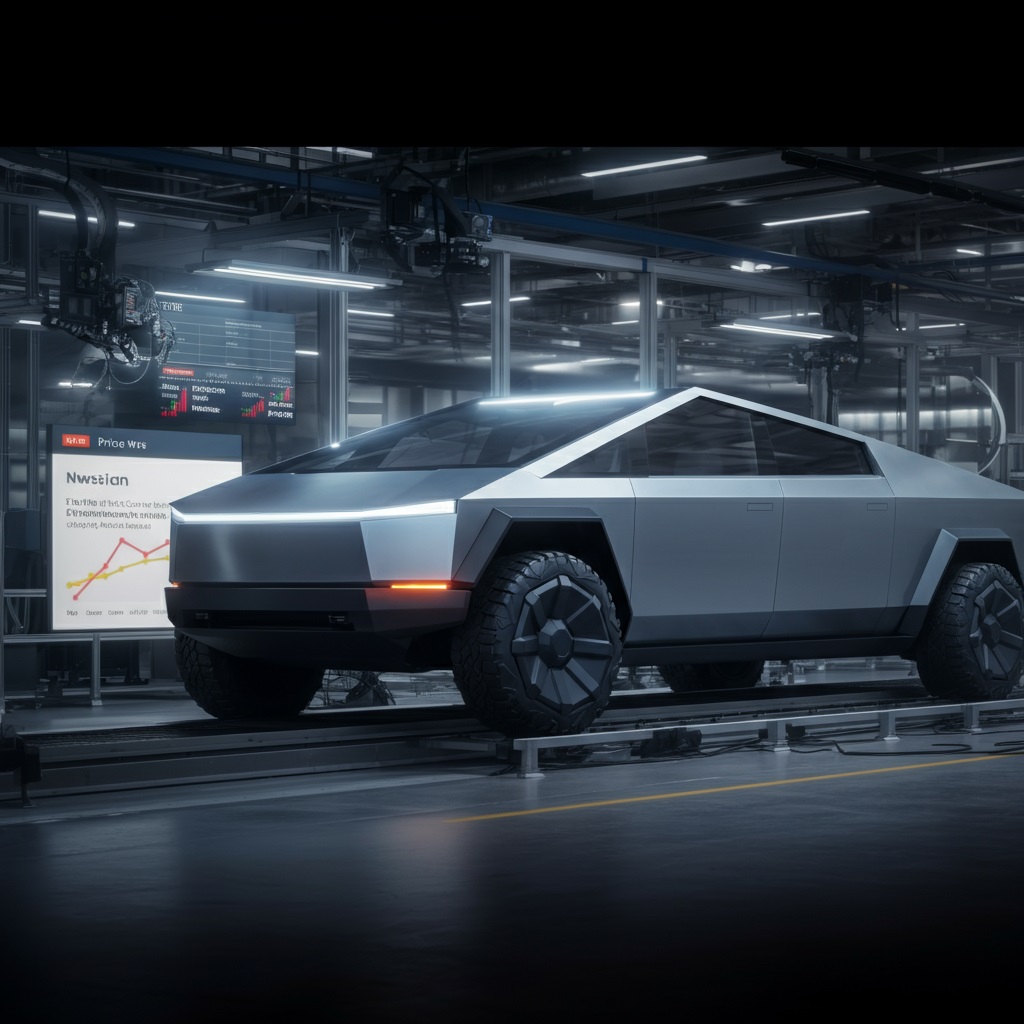The automotive world is witnessing a seismic shift as electric vehicles (EVs) disrupt traditional markets. Tesla’s much-anticipated Cybertruck ramp-up at the Texas Gigafactory and Rivian’s strategic moves in the EV space are igniting interest among tech enthusiasts, investors, and auto industry analysts alike. This blog dives into these developments, examining the opportunities and challenges shaping the competitive EV landscape.
Tesla’s Cybertruck Revolution at Full Throttle
Tesla’s Cybertruck, with its futuristic design and innovative features, has already captured the imagination of car enthusiasts. Now, with production scaling up at Tesla’s Texas Gigafactory, the company is poised to make a significant impact.
Texas Gigafactory Expansion
Tesla recently revealed ambitious plans to produce 250,000 Cybertrucks annually by 2025, leveraging the upgraded capabilities of its Texas Gigafactory. This state-of-the-art facility plays a pivotal role in Tesla’s strategy, enabling the mass production of Cybertrucks to meet rising consumer demand. Elon Musk has emphasized the factory’s role in achieving Tesla’s production goals, and activities at the plant are reportedly ahead of schedule.
The announcement has had tangible market effects—with Tesla’s shares climbing 8% following the news. Auto industry analysts see this as a strong signal of confidence in Tesla’s ability to ramp up production effectively.
Cybertruck’s Competitive Edge
Tesla’s Cybertruck boasts several features that make it a unique contender in the EV truck segment:
- Exoskeleton Design: Its stainless-steel body enhances toughness and durability.
- Autonomous Driver-Assist Technology: Tesla’s self-driving tech remains a key differentiator.
- Advanced Battery Tech: Promising an impressive range suitable for off-road and utility tasks.
While competitors like Ford and Rivian have released their own electric trucks, Tesla’s brand recognition and technological edge provide a distinct advantage.
The Price Wars Begin
The excitement around Tesla’s Cybertruck comes amid challenges in the EV space. Manufacturers are grappling with price sensitivity and slowing demand in international markets, particularly in China.
Ford and GM Cut EV Prices
Ford and General Motors are taking proactive steps to regain traction by slashing the prices of their flagship EVs. These moves reflect a growing price war in the EV sector. For instance:
- Ford recently reduced the price of its F-150 Lightning models to compete more directly with Tesla’s Cybertruck.
- GM has implemented selective price cuts on EV offerings across its Chevrolet line in response to stiff competition.
China’s Impact on Demand
China, the world’s largest EV market, has witnessed a decline in consumer demand due to economic headwinds. The country’s slowdown has created ripple effects across the EV industry, forcing automakers to rethink pricing and sales strategies in order to stay competitive.
Despite these broader challenges, Tesla remains ahead of the game, leveraging its Gigafactories and streamlined production processes to maintain cost efficiency and market dominance.
Rivian’s Strategic Shift into Electric Vans
While Tesla and legacy automakers engage in EV price wars and market dominance battles, Rivian is carving out a different path. The startup is pivoting toward the commercial EV segment, focusing on electric delivery vans as a major growth area.
Rivian’s $1.5 Billion Boost
Rivian recently secured $1.5 billion in funding, designed to accelerate the production of electric vans. This investment is a significant shift from the company’s consumer-focused offerings, such as the R1T pickup truck, to a more diversified strategy. Analysts note that Rivian’s move makes sense given the increasing demand for sustainable solutions in the logistics and delivery sectors.
Amazon Partnership Expands Scope Globally
The centerpiece of Rivian’s strategy is its partnership with Amazon, which includes plans to deploy 50,000 electric delivery vehicles globally by 2026. This partnership is a win-win:
- Amazon reduces its carbon footprint while achieving increased efficiency in its supply chain operations.
- Rivian enjoys substantial demand and early viability as a trusted commercial EV provider.
These vans are already hitting city streets in the U.S., and their global rollout represents a significant step toward curbing emissions in the e-commerce supply chain.
Challenges Ahead for Rivian
While Rivian’s pivot into commercial EVs is promising, it is not without risk:
- Profitability remains a critical concern, as Rivian is still navigating production scale-up for its electric vans.
- The company faces competition from startups and traditional automakers entering the commercial EV segment.
Despite these hurdles, Rivian’s versatility and collaboration with Amazon position it as a key player in shaping the commercial EV sector.
Read More⚡ How Retail Giants Are Revolutionizing Shopping with AI
What These Shifts Mean for the EV Market
The developments at Tesla and Rivian illustrate a fast-evolving EV market, driven by innovation, strategic pivots, and competitive pressures. Tesla’s vision for Cybertruck production and Rivian’s focus on commercial EVs underscore the varied approaches automakers are taking to address challenges and capture market share.
Opportunities for Investors
For investors, these trends reflect both risks and rewards. Tesla’s production milestones and brand appeal offer a reliable bet for those seeking long-term growth in the EV sector. Meanwhile, Rivian’s partnership with Amazon and its focus on the underserved commercial EV segment present a high-risk, high-reward dynamic—ideal for venture capital investors confident in Rivian’s long-term strategy.
A New Normal for Consumers
On the consumer side, competition and innovation are driving EV adoption. With a variety of electric trucks, sedans, and now commercial vans entering the market, car buyers can expect more choices at competitive prices.
Driving into the Future of EVs
As Tesla’s Cybertruck hits the roads and Rivian reshapes commercial logistics with electric vans, the future of EVs looks electrifying. For tech enthusiasts, investors, and industry analysts, these developments underline the importance of staying informed in a rapidly changing market.
To stay updated on electric vehicle trends and company profiles, subscribe to our newsletter or follow us on social media. For now, buckle up—it’s going to be an exciting ride.

